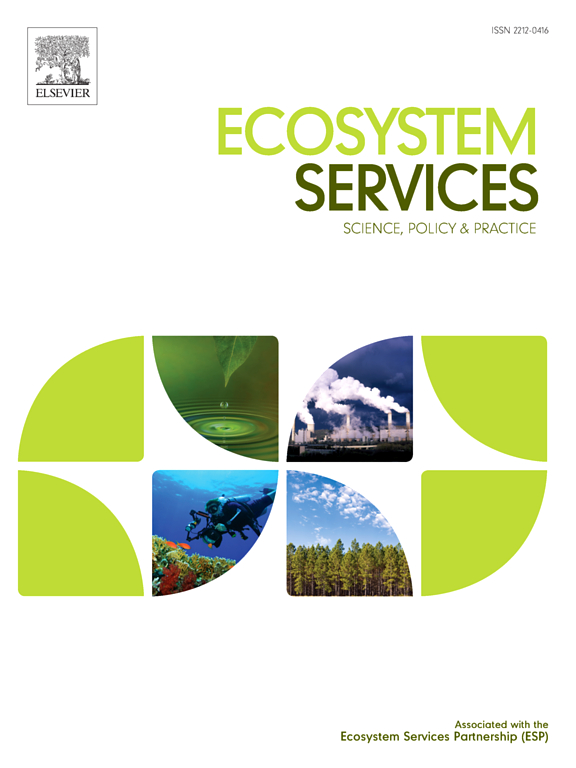揭示野生森林产品对欧洲生物经济的潜在社会经济作用
IF 6.6
2区 环境科学与生态学
Q1 ECOLOGY
引用次数: 0
摘要
尽管人们越来越关注野生森林产品(也称为非木质森林产品)的社会经济作用,但其作为文化服务的功能尚未得到全面的量化。这至少部分是由于重视粮食计划署作为提供服务的作用及其在农村经济中的商业价值。在这项研究中,我们首次将森林生态系统服务的经济评价与社会核算矩阵方法结合起来,分析了三个欧洲国家(捷克、意大利和瑞典)世界粮食计划署的社会组成部分。我们估计粮食计划署对运输服务以及食品和住宿服务有直接影响。同时,我们通过非市场估值来估计家庭幸福的价值。总体而言,我们的研究结果突出了与世界粮食计划署相关的文化服务对欧洲生物经济的价值。更好地了解森林提供的全部可用资源,可以为未来的政策决定提供信息,这些决策旨在提高社会的社会经济效益,同时可持续地管理森林生态系统。本文章由计算机程序翻译,如有差异,请以英文原文为准。
Revealing the hidden socioeconomic role of wild forest products for the European bioeconomy
Despite the increasing attention towards the socioeconomic role of wild forest products (WFPs) − also known as non-wood forest products (NWFPs) − their function as cultural service has yet to receive a comprehensive quantification. This, at least partially, is due to the attention given to WFPs as provisioning services, and their commercial values in the rural economy. In this study, we combined for the first time the economic evaluation of forest ecosystem services with a Social Accounting Matrix methodology to analyse the social component of WFPs in three European countries, namely Czechia, Italy, and Sweden. We estimated that WFPs have a direct effect on transport services, as well as food and accommodation services. At the same time, we estimated the value of household wellbeing via non-market valuation. Overall, our results highlight the value that cultural services linked to WFPs add to European bioeconomy. A better understanding of the complete range of available resources offered by forests can inform future policy decisions aimed at enhancing the socioeconomic benefits for societies while sustainably managing forest ecosystems.
求助全文
通过发布文献求助,成功后即可免费获取论文全文。
去求助
来源期刊

Ecosystem Services
ECOLOGYENVIRONMENTAL SCIENCES&-ENVIRONMENTAL SCIENCES
CiteScore
14.90
自引率
7.90%
发文量
109
期刊介绍:
Ecosystem Services is an international, interdisciplinary journal that is associated with the Ecosystem Services Partnership (ESP). The journal is dedicated to exploring the science, policy, and practice related to ecosystem services, which are the various ways in which ecosystems contribute to human well-being, both directly and indirectly.
Ecosystem Services contributes to the broader goal of ensuring that the benefits of ecosystems are recognized, valued, and sustainably managed for the well-being of current and future generations. The journal serves as a platform for scholars, practitioners, policymakers, and other stakeholders to share their findings and insights, fostering collaboration and innovation in the field of ecosystem services.
 求助内容:
求助内容: 应助结果提醒方式:
应助结果提醒方式:


